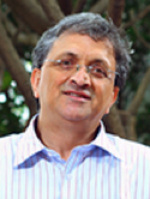Between Nationalism and Internationalism: The Political Philosophy of Rabindranath Tagore
Ramachandra Guha (Historian)
The Japan Foundation invited historian Dr. Ramachandra Guha and co-organized his lecture with International House of Japan, as part of Japan-India Dialogue 2014: Distinguished Visitors Program. The lecture titled "Between Nationalism and Internationalism: The Political Philosophy of Rabindranath Tagore" was held on March 18, 2015.
In this lecture, Dr. Guha concentrated on the aspect of Tagore as a prescient political thinker and reconstructed Tagore's political philosophy by focusing on what he said and did in his travels through Japan, China, and the United States. Tagore was worried about growing militarism in Japan, and spoke out against national and racial rivalries and hatreds. Tagore's visionary internationalism had a profound impact on the ideas of Mahatma Gandhi, the acknowledged leader of the Indian freedom struggle, and on Jawaharlal Nehru, the first and longest serving Prime Minister of India.
Click to view the entire lecture of Dr. Guha on YouTube.
 Ramachandra Guha
Ramachandra Guha
Dr. Ramachandra Guha is a historian and biographer based in Bangalore. He has taught at Yale and Stanford universities, held the Arne Naess Chair at the University of Oslo, and been the Indo-American Community Visiting Professor at the University of California, Berkeley. In 2011-2012 he served as the Philippe Roman Chair in History and International Affairs at the London School of Economics and Political Science.
His books include a pioneering environmental history, The Unquiet Woods (University of California Press, 1989), and an award-winning social history of cricket, A Corner of a Foreign Field (Picador, 2002). India After Gandhi (Macmillan/Ecco, 2007) was chosen as a book of the year by the Economist, Washington Post, Wall Street Journal, San Francisco Chronicle, Time Out, and Outlook, and as a book of the decade in the Times, Times of India, and the Hindu. His most recent book is Gandhi Before India (Allen Lane, 2014), which was chosen as a notable book of the year by the New York Times.
Apart from his books, Dr. Guha also writes a syndicated column that appears in six languages in newspapers with a combined readership of some twenty million. His books and essays have been translated into more than twenty languages. The New York Times has referred to him as "perhaps the best among India's nonfiction writers"; Time Magazine has called him "Indian democracy's pre-eminent chronicler."
Dr. Guha's awards include the Leopold-Hidy Prize of the American Society of Environmental History, the Daily Telegraph/Cricket Society Prize, the Malcolm Adideshiah Award for excellence in social science research, the Ramnath Goenka Prize for Excellence in Journalism Award, the Sahitya Akademi Award, and the R. K. Narayan Prize. In 2009, he was awarded the Padma Bhushan Award, the Republic of India's third highest civilian honor. In 2008, and again in 2013, Prospect magazine nominated Dr. Guha as one of the world's most influential intellectuals. In 2014, he was awarded an honorary doctorate in the humanities by Yale University.
Back Issues
- 2019.8. 6 Unraveling the Maker…
- 2018.8.30 Japanese Photography…
- 2017.6.19 Speaking of Soseki 1…
- 2017.4.12 Singing the Twilight…
- 2016.11. 1 Poetry? In Postwar J…
- 2016.7.29 The New Generation o…
- 2016.4.14 Pondering "Revitaliz…
- 2016.1.25 The Style of East As…
- 2015.9.30 Anime as (Particular…
- 2015.9. 1 The Return of a Chin…

